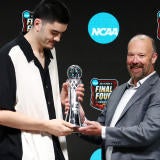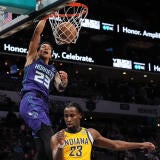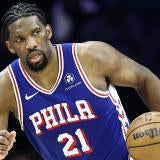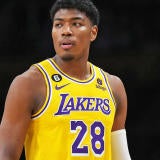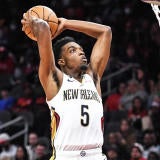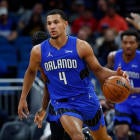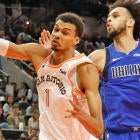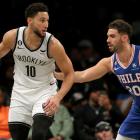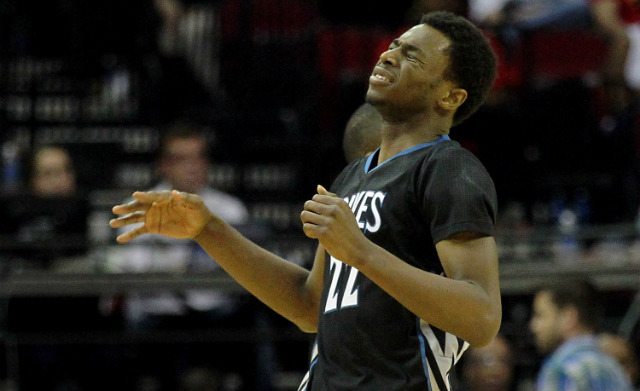
Timberwolves rookie Andrew Wiggins may not be the best rookie in the league on a per-minute basis, but he is overwhelming the Rookie of the Year debate with sheer volume. He has played nearly 500 minutes more than any other rookie this season, and has a 1,000-minute lead on the No. 3 guy.
And, while he noted that he might be hitting the dreaded rookie wall back in January, his playing time has actually gone up over the last two months, peaking at 38.9 minutes per game in March. Should Fantasy players be at all concerned about the toll this workload might take on him, or is it a good sign moving forward?
(If you ask Rudy Gobert, he'll tell you Wiggins is feeling just fine, thank you very much.)
Wiggins is already in rare territory, as just the sixth player in league history to record 2,500-plus minutes in his age-19 season. He is in good company with the other players who reached that mark, joining Dwight Howard, Chris Bosh, Carmelo Anthony, LeBron James and Kevin Durant; that's pretty much a list of the five-best players over the last decade.
We're dealing with just a five-player sample size here, but the minutes load didn't seem to take much of a toll on the other five, who missed just 18 games between them in their second seasons in the league. In fact, of the eight players in NBA history who averaged 30-plus minutes per game as a teenage rookie, only Kyrie Irving and Bradley Beal missed significant time in their sophomore campaign, and they each had red flags beyond their workload in their first seasons.
The small sample nature of the data renders any sort of deep analysis pretty moot, so we can't just say that Wiggins is fine playing this many minutes; every player is different, after all. The fact that he is playing more and more minutes as the season goes on is a little concerning, and it would probably be better for everyone if his role was scaled back just a bit over the final two weeks of the season.
Still, the fact Wiggins has been thrown into the fire should end up being a very good thing for his future development. There is still no guarantee that Wiggins is going to be a star, and you'll find plenty of people who still want to poke holes in his statistical profile. However, being able to hold your head above water -- let alone thrive, as he has done for long stretches -- at such a young age bodes very well for Wiggins' future.
The five players teenagers who logged at least 2,500 minutes as rookies saw their production rise nearly across the board the following year. On the aggregate, they improved their field-goal percentage by six points from year one to year to, their 3-point percentage by nine percent, their free-throw rate by 22 percent. They also improved their counting stats, recording 14.6 percent more rebounds, 26.1 percent more assists, 3 percent more steals and 16.7 percent more points per-36 minutes.
Coach Flip Saunders has had to strike a delicate balance between developing Wiggins and leaving him at risk for a potential stress or fatigue related injury, especially during meaningless games this late in the schedule. However, Wiggins has been just about the only member of the Timberwolves not to deal with some sort of nagging injury this season, so there aren't any obvious red flags here.
Even with 2,600 minutes under his belt, it's still easy to see Wiggins as something of a blank slate. Every thunderous dunk and deft spin to split a double team makes the highlight reel, but Wiggins still has so much room to grow into his game. The fact that he is getting so many reps under live game conditions at this age bodes exceptionally well for his development, and his game could explode next season.
The question you'll have to ask yourself when looking at Wiggins is how much of a premium are you willing to pay for that potential? Wiggins was already going in the sixth round this year, before








